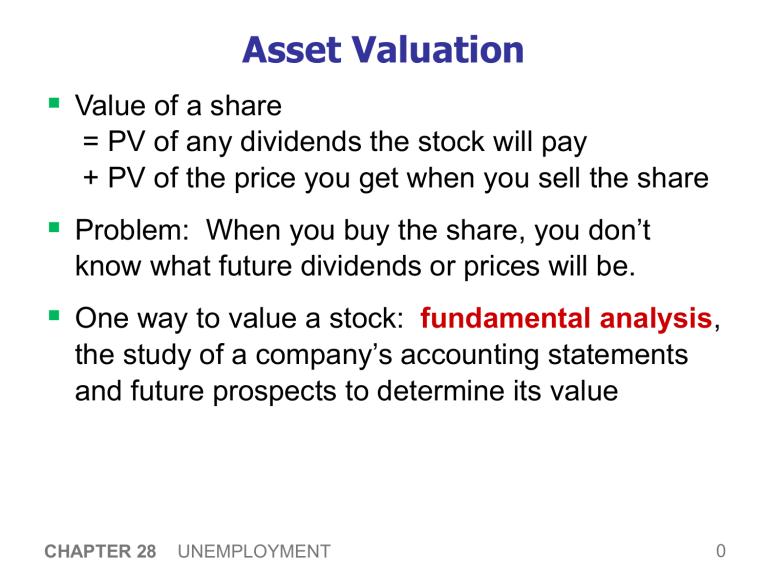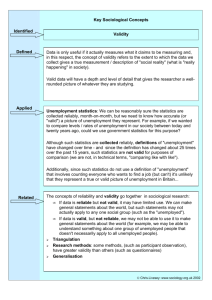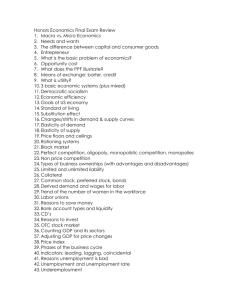
Asset Valuation
Value of a share
= PV of any dividends the stock will pay
+ PV of the price you get when you sell the share
Problem: When you buy the share, you don’t
know what future dividends or prices will be.
One way to value a stock: fundamental analysis,
the study of a company’s accounting statements
and future prospects to determine its value
CHAPTER 28
UNEMPLOYMENT
0
The Wall Street Analysts
CHAPTER 28
UNEMPLOYMENT
1
The Efficient Markets Hypothesis
Efficient Markets Hypothesis: the theory that
each asset price reflects all publicly available
information about the value of the asset
Mutual fund managers
• use fundamental analysis to assess value of all
•
•
publicly traded companies
buy shares when price < value,
sell shares when price > value
continuously monitor and act on any news
that affects the valuation of any stock
CHAPTER 28
UNEMPLOYMENT
2
Informational Efficiency
According to the Efficient Markets Hypothesis,
the stock market is informationally efficient:
each stock price reflects all available information
about the value of the company.
• When good news about a company’s prospects
becomes public, the value of the company rises,
so money managers buy lots of shares until the
price rises to the new, higher value.
• When bad news becomes public, the value of
the company falls, so money managers sell the
shares until their price falls by the same amount.
CHAPTER 28
UNEMPLOYMENT
3
The Efficient Markets Hypothesis
Stock prices determined by supply & demand.
In equilibrium,
• the number of people who believe a stock is
•
overvalued exactly balances the number who
believe it to be undervalued
the typical person perceives all stocks fairly
valued
At any moment, a stock price is the market’s
best guess of the company’s value
based on all available information.
CHAPTER 28
UNEMPLOYMENT
4
Suppose, shares of XYZ corporation are trading for
$100, and suppose you could predict – using public
information – that XYZ’s stock price will be $110
tomorrow. What would you do? You’d buy as many
shares as you could possibly afford, because the stock is
highly undervalued, and you can make a quick profit.
But everyone else has the same information as you, and
wants to make the quick profit, just like you. So they will
all buy XYZ shares.
Massive buying will bid up the price, and this will
continue until the price is about $110. Stock prices
adjust very quickly to changes in supply or demand, so it
won’t take long for this price adjustment to occur.
So, in order for you to profit from your prediction, you
have to act more quickly than everyone else. Is this
likely? No.
CHAPTER 28
UNEMPLOYMENT
5
Random Walk
Random walk: the path of a variable whose
changes are impossible to predict
The efficient markets hypothesis implies that
stock prices should follow a random walk.
CHAPTER 28
UNEMPLOYMENT
7
CHAPTER 28
UNEMPLOYMENT
8
The efficient markets hypothesis
According to this theory, the only thing that can
move stock prices is news that can change the
market’s perception of the company’s value.
In other words, something that the entire market
does not know but you do.
Such news is impossible to predict.
(Otherwise it wouldn’t really be news, and
would already be reflected in the stock price.)
CHAPTER 28
UNEMPLOYMENT
9
Trying to beat the Market?
CHAPTER 28
UNEMPLOYMENT
10
Evidence: Index Funds vs. Managed Funds
An index fund is a mutual fund that buys all the
stocks in a given stock index.
An actively managed mutual fund aims to buy
only the best stocks.
The efficient markets hypothesis implies that it is
impossible to consistently “beat the market.”
If true, the returns on actively managed funds
should not consistently exceed the returns on
index funds.
In fact, most actively managed funds perform
worse than index funds (and have higher fees).
CHAPTER 28
UNEMPLOYMENT
11
the beauty of
“effortlessness”
CHAPTER 28
UNEMPLOYMENT
12
CHAPTER 28
UNEMPLOYMENT
13
Market Irrationality
Economists have argued
that stock price
movements are partly
psychological:
1930s: John Maynard
Keynes said stock prices
are driven by investors’
“animal spirits” – irrational
waves of pessimism and
optimism
CHAPTER 28
UNEMPLOYMENT
14
Market Irrationality
1990s: Fed Chair
Alan Greenspan
said the stock
boom reflected
“irrational
exuberance”.
The bubble burst
around early
2000.
CHAPTER 28
UNEMPLOYMENT
15
Do you believe in Market Irrationality or
Market Rationality?
• It’s true that stock prices often move in ways
that are hard to explain rationally.
• Yet, it’s impossible to know what price
movements are “rational.”
• And if many investors behaved irrationally, there
would be profit opportunities for rational
investors. Yet, beating the market is nearly
impossible.
CHAPTER 28
UNEMPLOYMENT
16
CONCLUSION
This chapter has introduced some of the basic
tools people use when they make financial
decisions.
The efficient markets hypothesis teaches that a
stock price should reflect the company’s
expected future profitability.
Fluctuations in the stock market have important
macroeconomic implications, which we will study
later in this course.
CHAPTER 28
UNEMPLOYMENT
17
CHAPTER SUMMARY
The present value of any future sum is the amount
that would be needed today, given prevailing
interest rates, to produce that future sum.
Because of diminishing marginal utility of wealth,
most people are risk-averse. Risk-averse people
can manage risk with insurance, through
diversification, and by choosing a portfolio with a
lower risk and lower return.
CHAPTER 28
UNEMPLOYMENT
18
CHAPTER SUMMARY
The value of an asset equals the present value of
all payments its owner will receive. For a share of
stock, these payments include dividends plus the
final sale price.
According to the efficient markets hypothesis,
financial markets are informationally efficient,
a stock price always equals the market’s best
guess of the firm’s value, and stock prices follow a
random walk as new information becomes
available.
CHAPTER 28
UNEMPLOYMENT
19
Road Map
Chapter 25, we discuss how capital and labor are
among the primary determinants of output and growth.
In Chapter 26, we addressed how saving converted into
investment in capital goods.
In Chapter 27, we will show some of the tools people
and firms use when choosing capital projects in which to
invest.
Because both capital and labor are among the primary
determinants of output, Chapter 28 will address the
market for labor.
CHAPTER 28
UNEMPLOYMENT
20
Sometimes People Say that the Key of
Macroeconomics is on the Labor Market
Why?
Labor is one of key inputs for output production
(in addition to capital);
Employment is associated with household
welfare, the fundamental reason that we engage
in economic research.
A lot of macro puzzles and stylized facts are
about the labor market.
CHAPTER 28
UNEMPLOYMENT
21
What is the labor market all about?
Labor supply and labor demand;
At the equilibrium…
• Employment (number of employees; total
•
working hours…)
Wage rate (the return to labor)
Unemployment (those who do not have jobs and
are actively searching for jobs)
CHAPTER 28
UNEMPLOYMENT
22
28
Unemployment
PRINCIPLES OF
ECONOMICS
FOURTH EDITION
N. G R E G O R Y M A N K I W
PowerPoint® Slides
by Ron Cronovich
© 2007 Thomson South-Western, all rights reserved
Unemployment is not always bad!
CHAPTER 28
UNEMPLOYMENT
25
In this chapter, look for the answers to
these questions:
How is unemployment measured?
What is the “natural rate of unemployment”?
Why are there always some people unemployed?
How is unemployment affected by unions and
minimum wage laws?
What is the theory of efficiency wages, and how
does it help explain unemployment?
CHAPTER 28
UNEMPLOYMENT
26
How is unemployment Measured?
Labor Force Statistics
Produced by Bureau of Labor Statistics (BLS),
in the U.S. Dept. of Labor
Based on regular monthly survey of 60,000
households – Current Population Survey (CPS)
Based on “adult population” (16 yrs or older)
CHAPTER 28
UNEMPLOYMENT
27
Labor Force Statistics
BLS divides population into 3 groups:
•
employed: paid employees, self-employed,
and unpaid workers in a family business
•
unemployed: people not working who have
looked for work during previous 4 weeks
•
not in the labor force: everyone else
The labor force is the total # of workers, including
the employed and unemployed.
CHAPTER 28
UNEMPLOYMENT
28
CHAPTER 28
UNEMPLOYMENT
29
Labor Force Statistics
Unemployment rate (“u-rate”):
% of the labor force that is unemployed
u-rate
# of unemployed
= 100 x
labor force
Labor force participation rate:
% of the adult population that is in the labor force
labor force
labor force
= 100 x
participation rate
adult population
CHAPTER 28
UNEMPLOYMENT
30
1:
Calculate labor force statistics
ACTIVE LEARNING
Compute the labor force, u-rate, adult population,
and labor force participation rate using this data:
Adult population of the U.S.
by group, October 2006
# of employed
145.3 million
# of unemployed
6.7 million
not in labor force
77.7 million
31
ACTIVE LEARNING
Answers
1:
Labor force = employed + unemployed
= 145.3 + 6.7
= 152 million
U-rate
= 100 x (unemployed)/(labor force)
= 100 x 6.7/152
= 4.4%
32
ACTIVE LEARNING
Answers
1:
Working-age Population = labor force + not in labor
force
= 152 + 77.7
= 229.7
LF partic. rate
= 100 x (labor force)/(population)
= 100 x 152/229.7
= 66.1%
33
CHAPTER 28
UNEMPLOYMENT
34
U.S. Unemployment Since 1960
12
(percentage of labor force)
Unemployment rate
10
8
6
Natural rate of
unemployment
4
2
0
1960
1965
CHAPTER 28
1970
1975
UNEMPLOYMENT
1980
1985
1990
1995
2000
2005
35
Labor Market Statistics for Different Groups
The BLS publishes these statistics for
demographic groups within the population.
These data reveal widely different labor market
experiences for different groups.
CHAPTER 28
UNEMPLOYMENT
36
Labor Market Statistics for Whites & Blacks,
January 2006
Adults (20 yrs & older)
u-rate
LF part. rate
White, male
3.6%
76.4%
White, female
3.7
59.7
Black, male
7.5
69.8
Black, female
8.1
64.4
Gender does not generate big difference in
unemployment rate, but does in the participation rate;
However, races play a big role in unemployment.
CHAPTER 28
UNEMPLOYMENT
37
Labor Market Statistics for Whites & Blacks,
January 2006
Teens (16-19 yrs)
u-rate
LF part. rate
White
13.3
47.1
Black
31.4
30.9
However, for teens, races play a big role in
both participation rate and unemployment
rate!
CHAPTER 28
UNEMPLOYMENT
38
Labor Market Statistics for Other Groups,
January 2006
All ages
u-rate
LF part. rate
Asian
3.2
65.7
Hispanic
5.8
69.3
CHAPTER 28
UNEMPLOYMENT
39
Labor Market Statistics by Education Level,
January 2006
Adults (25 yrs & older)
u-rate
LF part. rate
less than h.s.
7.0%
46.0%
h.s. diploma
4.4
62.5
some college or
assoc degree
3.5
72.5
bachelor’s
degree or more
2.1
78.3
CHAPTER 28
UNEMPLOYMENT
40
LF Participation Rates by Sex, Since 1950
100
90
80
Men
70
60
50
Women
40
30
20
1950 1955 1960 1965 1970 1975 1980 1985 1990 1995 2000 2005
Why?
For women:
• Technological advancement makes housework
•
•
easier;
Job types;
Social attitudes.
For men:
•?
•?
CHAPTER 28
UNEMPLOYMENT
42
Kramer Lifestyle
of Adult Male Joblessness
In 2002, 8% of adult
male are not attending
school or working.
Only some of jobless
males are disabled;
Most of them received
some income averaged
annually around $11,000.
And most are single.
CHAPTER 28
UNEMPLOYMENT
43
ACTIVE LEARNING
Exercise
2:
In each of the following, what happens to the u-rate?
Does the u-rate give an accurate impression of what’s
happening in the labor market?
A. Susan lost her job, and begins looking for a new
one.
B. John, a steelworker who has been out of work
since his mill closed last year, becomes
discouraged and gives up looking for work.
C. Sam, the earner in his family of 5, just lost his
$80,000 job as a research scientist. Immediately,
he takes a part-time job at McDonald’s until he can
find another job in his field.
44
ACTIVE LEARNING
Answers
2:
A. Sue lost her job, and begins looking for a new one.
u-rate rises
A rising u-rate gives the impression that the labor
market is worsening, and it is.
45
ACTIVE LEARNING
Answers
2:
B. Jon has been out of work since last year,
becomes discouraged, stops looking for work.
Discouraged workers
• would like to work but have given up looking for jobs
• classified as “not in the labor force” rather than
“unemployed”
u-rate falls, because Jon is no longer counted as
unemployed.
A falling u-rate gives the impression that the labor
market is improving, but it is not.
46
ACTIVE LEARNING
Answers
2:
C. Sam lost his $80,000 job, and takes a part-time
job at McDonald’s until he finds a better one.
u-rate unchanged, because a person is “employed”
whether they work full or part time.
Things are worse, but the u-rate fails to show it.
47
What Does the U-Rate Really Measure?
The u-rate is not a perfect indicator of joblessness
or the health of the labor market:
• excludes discouraged workers
• does not distinguish between full-time and
•
part-time work, or people working part time
because full-time jobs are not available.
Also, some people may misreport their work
status in the BLS survey.
Despite these issues, the u-rate is still a very
useful meter of the labor market & economy.
CHAPTER 28
UNEMPLOYMENT
48
CHAPTER 28
UNEMPLOYMENT
49
The Duration of Unemployment
Most spells of unemployment are short:
• Typically 1/3 of the unemployed
•
have been unemployed < 5 weeks,
2/3 have been unemployed < 14 weeks.
Only 20% have been unemployed > 6 months.
Yet, most observed unemployment is long term.
• The small group of long-term unemployed
persons has fairly little turnover, so it accounts for
most of the unemployment observed over time.
Knowing these facts helps policymakers design
better policies to help the unemployed.
CHAPTER 28
UNEMPLOYMENT
50
A small group stays unemployed all the
time, while others keep moving in and
out of unemployment
CHAPTER 28
UNEMPLOYMENT
51
Who are unemployed?
CHAPTER 28
UNEMPLOYMENT
52
Cyclical Unemployment vs. the Natural Rate
There’s always some unemployment, though the
u-rate fluctuates from year to year.
The natural rate of unemployment
• the normal rate of unemployment around which
the actual unemployment rate fluctuates
cyclical unemployment
• the deviation of unemployment from its
natural rate
• associated with business cycles, which we’ll
study in later chapters
CHAPTER 28
UNEMPLOYMENT
53
U.S. Unemployment Since 1960
12
(percentage of labor force)
Unemployment rate
10
8
6
Natural rate of
unemployment
4
2
0
1960
1965
1970
1975
1980
1985
1990
1995
2000
2005
Why is unemployment rate higher in
Europe and Canada?
CHAPTER 28
UNEMPLOYMENT
55
Explaining the Natural Rate: An Overview
Even when the economy is doing well, there is
always some unemployment, including:
frictional unemployment
• It takes time to find a job that suits you.
• short-term for most workers
structural unemployment
• occurs when there are fewer jobs than workers
• usually longer-term
CHAPTER 28
UNEMPLOYMENT
56
Job Search
Workers have different tastes & skills, and
jobs have different requirements.
Job search is the process of matching workers
with appropriate jobs.
Sectoral shifts are changes in the composition of
demand across industries or regions of the country.
Such shifts displace some workers,
who must search for new jobs appropriate
for their skills & tastes.
The economy is always changing,
so some frictional unemployment is inevitable.
CHAPTER 28
UNEMPLOYMENT
57
Frictional Unemployment
CHAPTER 28
UNEMPLOYMENT
58
To reduce friction
Public Policy and Job Search
•
Govt employment
agencies:
give out information about
job vacancies to speed up
the matching of workers
with jobs
•
Public training programs:
aim to equip workers
displaced from declining
industries with the skills
needed in growing
industries
Internet!
CHAPTER 28
UNEMPLOYMENT
59
However…
policy may also increase frictional
unemployment
CHAPTER 28
UNEMPLOYMENT
60
Unemployment Insurance
Unemployment insurance (UI):
a govt program that partially protects workers’
incomes when they become unemployed
UI increases frictional unemployment.
To see why, recall one of the
Ten Principles of Economics:
People respond to incentives.
UI benefits end when a worker takes a job,
so workers have less incentive to search or
take jobs while eligible to receive benefits.
CHAPTER 28
UNEMPLOYMENT
61
Unemployment Insurance
Benefits of UI:
reduces uncertainty over incomes
gives the unemployed more time to search,
resulting in better job matches and thus higher
productivity
CHAPTER 28
UNEMPLOYMENT
62
Explaining Structural Unemployment
Structural
unemployment
occurs when not
enough jobs to
go around.
W
unemployment S
actual
wage
W1
WE
Occurs when wage
is kept above eq’m.
There are three
reasons for this…
CHAPTER 28
UNEMPLOYMENT
D
L
63
Things that can keep wage above the
equilibrium level…
CHAPTER 28
UNEMPLOYMENT
64
1. Minimum-Wage Laws
The min. wage may exceed the eq’m wage
for the least skilled or experienced workers,
causing structural unemployment.
But this group is a small part of the labor force,
so the min. wage can’t explain most
unemployment.
CHAPTER 28
UNEMPLOYMENT
65
2. Unions
Union: a worker association that bargains with
employers over wages, benefits, and working
conditions
Unions exert their market power to negotiate
higher wages for workers.
The typical union worker earns 20% higher
wages and gets more benefits than a nonunion
worker for the same type of work.
CHAPTER 28
UNEMPLOYMENT
66
2. Unions
When unions raise the wage above eq’m,
quantity of labor demanded falls and
unemployment results.
“Insiders” – workers who remain employed,
they are better off
“Outsiders” – workers who lose their jobs,
they are worse off
Some outsiders go to non-unionized labor
markets, which increases labor supply and
reduces wages in those markets.
CHAPTER 28
UNEMPLOYMENT
67
2. Unions
Are unions good or bad? Economists disagree.
Critics:
Unions are cartels. They raise wages above eq’m,
which causes unemployment and/or depresses
wages in non-union labor markets.
Advocates:
Unions counter the market power of large firms,
make firms more responsive to workers’ concerns.
CHAPTER 28
UNEMPLOYMENT
68
Henry Ford Again…
CHAPTER 28
UNEMPLOYMENT
69
He was very nice…
In 1914, he paid his employees $5 per workday, almost
twice as much as the market level.
Was he only be nice?
After all, he is a profit maximizer.
Workers organized in an assembly line are highly interdependant. If one worker is absent, other workers are
less able to complete their own tasks.
Quite rate dropped significantly after the increase in
wage offered by the Ford Motor Company.
CHAPTER 28
UNEMPLOYMENT
70
3. Efficiency Wages
The theory of efficiency wages:
firms voluntarily pay above-equilibrium wages to
boost worker productivity.
Different versions of efficiency wage theory
suggest different reasons why firms pay high
wages.
CHAPTER 28
UNEMPLOYMENT
71
3. Efficiency Wages
Four reasons why firms might pay efficiency wages:
1. Worker health
In less developed countries, poor nutrition is a
common problem. Paying higher wages allows
workers to eat better, makes them healthier,
more productive.
2. Worker turnover
Hiring & training new workers is costly.
Paying high wages gives workers more
incentive to stay, reduces turnover.
CHAPTER 28
UNEMPLOYMENT
72
3. Efficiency Wages
Four reasons why firms might pay efficiency wages:
3. Worker quality
Offering higher wages attracts better job applicants,
increases quality of the firm’s workforce.
4. Worker effort
Workers can work hard or shirk. Shirkers are fired
if caught. Is being fired a good deterrent?
Depends on how hard it is to find another job.
If market wage is above eq’m wage, there aren’t
enough jobs to go around, so workers have more
incentive to work not shirk.
CHAPTER 28
UNEMPLOYMENT
73
ACTIVE LEARNING
Exercise
3:
Which of the following would be most likely to reduce
frictional unemployment?
A. The govt eliminates the minimum wage.
B. The govt increases unemployment insurance
benefits.
C. A new law bans labor unions.
D. More workers post their resumes at Monster.com,
and more employers use Monster.com to find
suitable workers to hire.
E. Sectoral shifts become more frequent.
74
ACTIVE LEARNING
Answers
3:
Which of the following would be most likely to reduce
frictional unemployment?
A. The govt eliminates the minimum wage.
C. A new law bans labor unions.
These are likely to reduce
structural unemployment,
not frictional unemployment.
75
ACTIVE LEARNING
Answers
3:
Which of the following would be most likely to reduce
frictional unemployment?
B. The govt increases unemployment insurance
benefits.
E. Sectoral shifts become more frequent.
These are likely to increase
frictional unemployment, not reduce it.
76
ACTIVE LEARNING
Answers
3:
Which of the following would be most likely to reduce
frictional unemployment?
D. More workers post their resumes at Monster.com,
and more employers use Monster.com to find
suitable workers to hire.
Likely to speed up the process of
matching workers & jobs, which would
reduce frictional unemployment.
77
Explaining the Natural Rate of
Unemployment: A Summary
The natural rate of unemployment consists of
frictional unemployment
• it takes time to search for the right jobs
• occurs even if there are enough jobs to go around
structural unemployment
• when wage is above eq’m, not enough jobs
• due to min. wages, labor unions, efficiency wages
In later chapters, we will learn about cyclical
unemployment, the short-term fluctuations in
unemployment associated with business cycles.
CHAPTER 28
UNEMPLOYMENT
78
Why is unemployment rate higher in
Europe and Canada?
CHAPTER 28
UNEMPLOYMENT
79
CHAPTER SUMMARY
The unemployment rate is the percentage of those
who would like to work who do not have jobs.
Unemployment and labor force participation vary
widely across demographic groups.
The natural rate of unemployment is the normal
rate of unemployment around which the actual
rate fluctuates. Cyclical unemployment is the
deviation of unemployment from its natural rate,
and is connected to short-term economic
fluctuations.
CHAPTER 28
UNEMPLOYMENT
80
CHAPTER SUMMARY
The natural rate includes frictional unemployment
and structural unemployment.
Frictional unemployment occurs when workers
take time to search for the right jobs.
Structural unemployment occurs when aboveequilibrium wages result in a surplus of labor.
Three reasons for above-equilibrium wages
include minimum wage laws, unions, and
efficiency wages.
CHAPTER 28
UNEMPLOYMENT
81
Second Midterm
This coming Thursday;
It will cover chapters 26, 27, and 28.
Please arrive five minutes earlier with ink pens,
your ID, and non-programmable calculator;
Sample exam posted already.
CHAPTER 28
UNEMPLOYMENT
82







